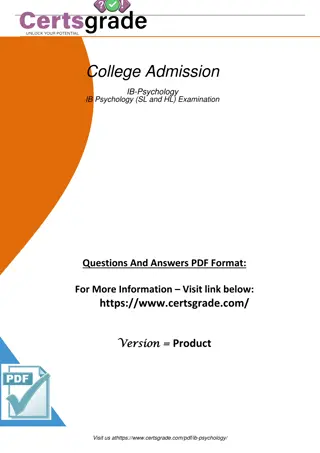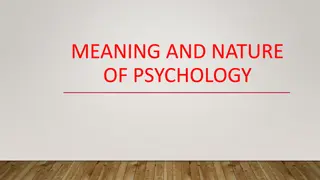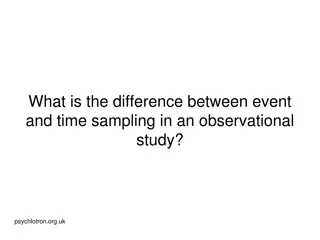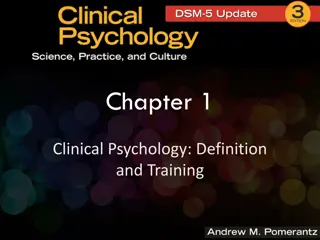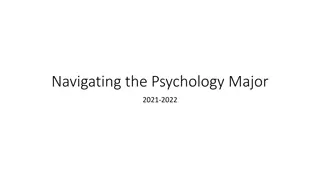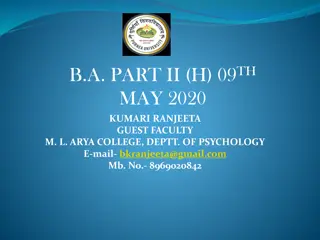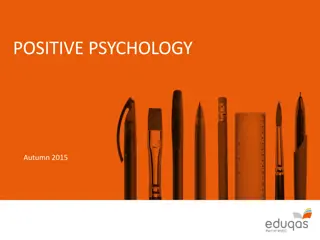
Evolution of Psychology from Ancient Times to Modern Science
Explore the fascinating journey of psychology from ancient Egyptian descriptions of the brain to the philosophies of Plato, Pythagoras, and Aristotle. Discover the influence of figures like Anton Mesmer and Wilhelm Wundt in shaping the field of psychology as we know it today, encompassing disciplines like neuroscience, sociology, and philosophy. Dive into the study of mind and behavior through experimental and applied psychology, including areas like sports psychology and marketing.
Download Presentation

Please find below an Image/Link to download the presentation.
The content on the website is provided AS IS for your information and personal use only. It may not be sold, licensed, or shared on other websites without obtaining consent from the author. If you encounter any issues during the download, it is possible that the publisher has removed the file from their server.
You are allowed to download the files provided on this website for personal or commercial use, subject to the condition that they are used lawfully. All files are the property of their respective owners.
The content on the website is provided AS IS for your information and personal use only. It may not be sold, licensed, or shared on other websites without obtaining consent from the author.
E N D
Presentation Transcript
Ancient Egyptians created an early description of the brain s physiology Plato, Pythagoras, and Aristotle all were interested in the philosophy of the mind. Lin as part of China s school examination system Ahmed [psyche] gets sick, the body may also find no joy in life and may eventually develop a physical illness ( Ancient Egyptians created an early description of the brain s physiology Plato, Pythagoras, and Aristotle all were interested in the philosophy of the mind. Lin Xie as part of China s school examination system Ahmed ibn [psyche] gets sick, the body may also find no joy in life and may eventually develop a physical illness (Deuraseh Xie, carried out the first psychological test , carried out the first psychological test ibn Sahl Sahl al al- -Balkhi Balkhi: "if the : "if the nafs nafs Deuraseh, 2005). , 2005).
Anton Mesmer: an Austrian who would use what he termed gravity and animal magnetism to cure ills of the mind and body. He was discredited, but his work led to hypnotism Phrenology: different parts which govern different aspects of our bodies Anton Mesmer: an Austrian who would use what he termed gravity and animal- - magnetism to cure ills of the mind and body. He was discredited, but his work led to hypnotism Phrenology: the skull and the brain have different parts which govern different aspects of our bodies ( (Django skull and the brain have Django Unchained Unchained!) !)
A science which coalesced out of many scientific disciplines: Neuroscience, physiology, sociology, anthropology, and philosophy Apply scientific method to the study of the brain, the mind, and human behavior Wilhelm Wundt established the first lab to study psychology in 1879.
From the Merriam Websters Dictionary: the study of mind and behavior Experimental psychology Uses scientific method of experimental design Looking for the reasons behind behaviors and cognitions Applied psychology Uses psychological theories and concepts to help people overcome their problems The foundation of counseling and therapy Sports psychology, marketing
Psychoanalysis and Psychodynamic Behaviorism Humanistic Person-centered Pragmatic Cognitive Gestalt Existential Choice Rational Emotive Behavioral Therapy Contemporary Solution Focused Therapy Feminist Therapy Narrative Therapy
Early (1890s-1930s) Pavlov, Freud, Jung, Adler, Eric Erickson Modern (1930s-1980s) Carl Rodgers, Fritz and Laura Perlz, Irvin Yalom, Victor Frankl, Rollo May, B.F. Skinner, Arnold Lazarus Current (1980s-present) Albert Bandura, Aaron Beck, William Glassner, Albert Ellis
Deuraseh, N., Abu Talib, M. (2005) "Mental health in Islamic medical tradition", The International Medical Journal 4 4 (2), p. 76- 79. Merriam-Webster s Dictionary. (2012) Retrieved from: http://www.merriam-webster.com/


